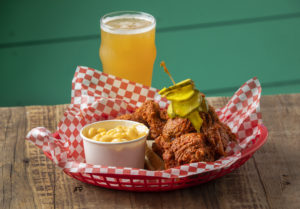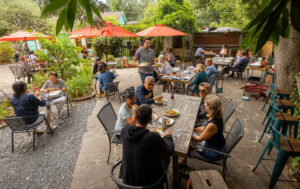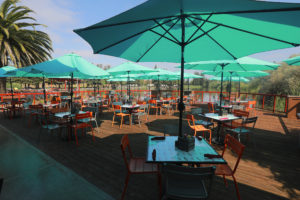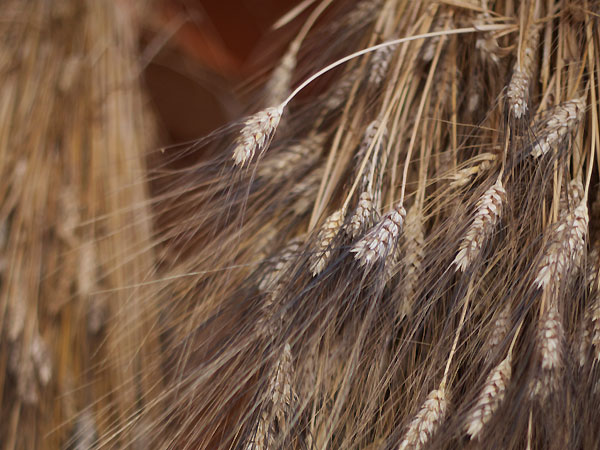[sh-slideshow-post id=”26206″]
It required a determined vision to rip out acres of valuable Russian River Valley vineyards. But replacing that land with wheat, heirloom vegetables and grazing area for heritage breed pigs? That required not only vision, but capital and chutzpah.
Front Porch Farm, owned by environmentalist, philanthropist and former Esprit-Europe CEO Peter Buckley and his wife, Mimi, is a 120-acre experiment in biodynamic farming at an idyllic spot called Diggers Bend, about 10 minutes east of Healdsburg. Well-known winemaker Matt Taylor (formerly of Araujo Estate Wines) has been tapped to manage the farm, starting with growing one of the few crops absent in the San Francisco/Bay Area foodshed, wheat.
“Grains on this small of a scale don’t make money,” says Sam Bilbro, who serves as the farm’s tour guide, marketing director and farmhand. “But local grains are really important,” he adds. I met him one afternoon at the Sebastopol Grange as he was delivering buckets of milled grains to a pop-up CSA project run by FEED Sonoma and Spiral Foods.
For legions of locavores, the addition of local wheat is like, well, finding out there’s a coffee plantation in your backyard. Or a foie gras tree. Suffice to say its a Big Deal (especially when folks like Michael Pollan, Craig Ponsford and Harold McGee are paying attention).
Why does the foodshed matter?
The Bay Area is a cornucopia of produce, dairy and meat, but could we sustain ourselves entirely with what is produced within 100 miles of the Golden Gate bridge? A study in 2008 found that the answer was a qualified “yes” with a few exceptions.
“Some basic commodities like wheat, for example, are not produced in abundance in the region, mainly because other crops like fruits and vegetables yield higher economic returns to growers,” said the American Farmland Trust report.
As we become increasingly interested in lowering our carbon footprint and supporting local farms, it becomes increasingly important to diversity our food system and support a wider variety of crops.
“People talk a lot about eating locally,” said Bilbro, stomping through mud and dirt around the farm as tractors and heavy equipment puttered away in the background. “But you can literally eat an entire meal from this farm.
According to the Front Porch Farm website: “We initially planted heritage wheat varieties just because we love the beauty of a ripe field. Soon we discovered that scattered about in Sonoma and Mendocino Counties there were other contrarians planting wheat for the same reason but also to make their local foodsheds more resilient.”
The first grains harvested and milled at Front Porch include durum and rare Italian Bolero as well as farro, rye and barley. The grains are milled in Mendocino by Doug Mosel, who began the Mendocino Grain project in 2010 to revive local grain production. Bilbro expects to begin milling at SHED, a Healdsburg food and farming project that’s expected to open in February 2013. They plan to have a total of 18 acres devoted to grains next year. All that grain also means the possibility of locally-produced whiskey. “It’s the future for the majority of our grain program,” said Taylor.
Walking through the property’s newly constructed sheds, sheafs of dried wheat hang from the ceilings. “We could literally sell those for more than the milled wheat,” says Bilbro. It’s a money-losing proposition for sure, but something the Buckley’s are dedicated to supporting. Taylor adds that it isn’t really about losing money, but trying to do something right for the community. “We feel we have an obligation,” he said. Already, Bay Area restaurants like Oliveto in Oakland and Community Grains, makers of organic pastas are supporting and buying the locally grown wheat.
In addition to the wheat, which is actually a small portion of the land, the biodynamic farm (a style of land-management that aims to not only sustain the land but integrate animals, healing “teas” and natural cycles of the earth into farming practices and eschews monoculture) also sustains a produce garden that’s been supplying Healdsburg restaurants like Ari Rosen’s Scopa and Campo Fina.
The farm also has the country’s only breeding stock of Cinta Senese pigs, a rare and ancient Italian breed prized for their fat, which is high in omega 3 and 6. Four “families”, a total of 21 pigs with distinct bloodlines arrived in the U.S. in June after extensive quarantines. As the animals breed, subsequent stock will be moved to a 2,000-acre ranch in Yorkville for harvest. Expect a collective whoop by local salumists when that day comes.
Cinta Sonoma from Oliveto Community on Vimeo.
It wouldn’t be fair, however, not to mention the farm’s vineyards, which take up about twelve acres. Taylor has already bottled Front Porch’s first vintage of mostly Rhone blends.
“We want to do good. We want to restore the beauty of this place,” says Bilbro, nuzzling up to the 300-pound pigs who root and grunt at our feet, practically knocking us over with their exuberance. “We are growing the soil. It’s a dream,” he says.










